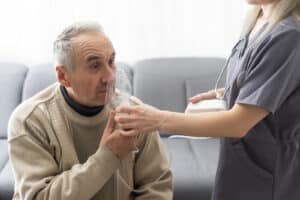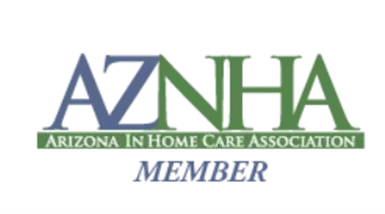
More than 15 million older adults have COPD. And many of those seniors also have accompanying respiratory conditions like lung cancer, emphysema, or chronic bronchitis. Seniors who have COPD can age in place if they choose, but it’s strongly recommended that they have elder care. Elder care at home helps seniors with everyday tasks and makes independent living easier for them.
Seniors who haven’t been diagnosed with COPD but have risk factors for developing this disease should be aware of the symptoms of COPD. Getting diagnosed early and starting treatment right after diagnosis can increase the chances that seniors can slow down the progression of the disease.
Shortness of Breath
One of the most common symptoms of COPD is a persistent shortness of breath. Seniors with COPD may experience difficulty breathing during physical activity or even at rest. As the disease progresses, this symptom tends to worsen. Seniors may notice that they become short of breath just doing normal things like walking around the house or getting dressed.
Chronic Cough
A chronic, productive cough that produces mucus or phlegm is often an early sign of COPD. This cough can be persistent and may interfere with daily life, causing discomfort and fatigue.
Increased Mucus Production
Seniors with COPD often have increased mucus or sputum production in their airways. This can lead to coughing fits and frequent throat clearing. Seniors that experience severe post-nasal drip at night or who have allergies should see a doctor to determine if their excessive mucus is due to allergies or COPD.
Wheezing
Wheezing is a high-pitched whistling sound that occurs when breathing. It is a common symptom of COPD and is often heard during exhalation.
Chest Tightness
Seniors with COPD may experience a sensation of tightness or pressure in the chest. This discomfort can be particularly noticeable during episodes of breathlessness.
Frequent Respiratory Infections
COPD can weaken the immune system’s ability to defend against infections. Seniors may experience more frequent respiratory infections, such as bronchitis or pneumonia. Seniors may also struggle longer to get rid of viral respiratory infections.
Barrel Chest
In advanced stages of COPD, some seniors may develop a characteristic physical sign known as “barrel chest.” This occurs due to increased air trapped in the lungs, causing the chest to expand.
Fatigue
COPD often leads to chronic fatigue, as the body must work harder to breathe. Seniors may feel exhausted even with minimal physical exertion.
Reduced Exercise Tolerance
As the disease progresses, seniors with COPD may find it increasingly difficult to engage in physical activities. This reduced exercise tolerance can lead to a sedentary lifestyle, which further contributes to deconditioning.
Cyanosis
In severe cases, decreased oxygen levels in the blood can cause a bluish tint to the lips and fingertips, a condition known as cyanosis. This is a sign of inadequate oxygenation and requires immediate medical attention.
Unintended Weight Loss
COPD can lead to a loss of appetite and unintentional weight loss, particularly in advanced stages of the disease.
Difficulty Sleeping
Seniors with COPD may experience difficulty sleeping due to breathlessness, coughing, or discomfort. This can lead to poor sleep quality and exacerbate fatigue.
If you or an aging loved one are considering hiring Elder Care in Sun Lakes, AZ, or anywhere in the East Valley, please contact the caring staff at Legacy Home Care.
Call (480) 777-0070
Source 1 / Source 2
Legacy Home Care has been serving the valley since 2007. We are family owned and operated with over 75 caregivers. We offer a customized care plan that includes services such as: Hourly Senior Home Care, 24-Hour Home Care, Dementia Care, Personal Care and Companion Care. Also ask us about our Veterans' Home Care program.
- Health Dangers of Stress for Seniors - March 20, 2025
- Why Companion Care Is Great For Seniors Living At Home - March 7, 2025
- Tips for Helping Your Senior Manage Brain Fog - February 19, 2025



